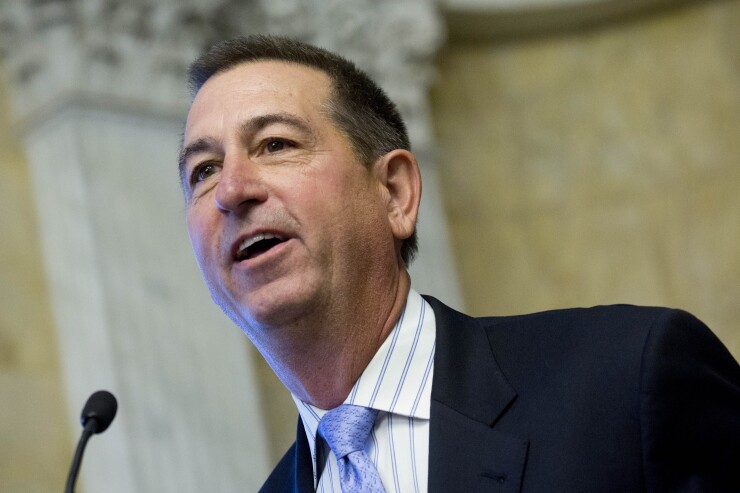WASHINGTON — Comptroller of the Currency Joseph Otting said he is "hopeful" all three bank regulators will jointly propose Community Reinvestment Act reforms by the summer, but he hinted that, if they cannot agree, his agency is ready to proceed with a CRA revamp on its own.
“My preference 110% is to be able to do things jointly,” but “I have a responsibility to the banks to which we regulate and the communities across America that are beneficiaries of CRA,” Otting said Thursday at a meeting of Women in Housing and Finance. “And if I really feel that it can benefit those communities and we’re restricting that, it doesn’t mean we all have to do things the same.”
Otting, who serves as the acting director of the Federal Housing Finance Agency as well, also addressed recent questions about whether the Trump administration or Congress will take the lead on reforming the government-sponsored enterprises Fannie Mae and Freddie Mac.

Otting's comment at a recent FHFA staff meeting stoked speculation that the administration may try to end the GSEs' conservatorships without legislation. Congress has been at an impasse over what to do with the mortgage giants for years.
"Our preference would always be [a] legislative fix to these issues. But this has sat here for a long period of time," Otting said. Not to get too technical but you have administrative and legislative actions. And there are enormous powers" to allow the Treasury secretary and the FHFA director "to take steps. But I do think it needs to get resolved and I do think it needs to get resolved where those entities are well capitalized and have good liquidity and are executing proper management."
The Office of the Comptroller of the Currency has spearheaded CRA reform talks and last year solicited public comment on its own about how to update and streamline the way banks are graded for lending to their communities.
The other regulators overseeing the law — the Federal Reserve and the Federal Deposit Insurance Corp. — have been cautious about joining the OCC on a reform plan. However, Otting said the OCC has shared the 1,500 public comments — responding to the agency's advance notice of proposed rulemaking —with the other agencies and expects all three ultimately to issue a notice of proposed rulemaking together.
“I’m hopeful by sometime in the summer, we’ll be in a position that the FDIC and Fed, and ourselves can agree on what the notice of proposed rulemaking would look like,” Otting said. “And then we would re-release that back to the market and ask for people’s comments.”
Otting added that there would likely be a 75-day comment period once the NPR is released.
“Then we’ll take that and hopefully, move towards a rule,” he said.
Otting also responded to criticism by community groups that the CRA reform effort may result in a less demanding regime for banks.
An overhaul is not meant “to cut CRA back,” Otting said. “I think actually banks will do more if given the opportunity to take some of the restrictions away from them.”
The questions the OCC proposed last year in its initial notice were broad, for example asking whether regulators should create a new measurement system to grade banks on their community lending activities, as well as a new system for determining a bank's CRA assessment area.
The exact nature of any disagreement between the agencies remains unclear.
“I would want the final rule to ensure that the original congressional intent behind the CRA" is satisfied, FDIC Chairman Jelena McWilliams said
Otting stressed that there is a need for more consistency in how CRA exams are conducted. They are inconsistent across the agencies and within the OCC itself, he said, so the OCC doing a rule itself would bring some improvement.
“Today the way the Fed does CRA exams, the way the FDIC does CRA exams and the way we do CRA exams are different and they’re not applied consistently. And I would tell you, within the OCC . . . there’s differences the way each of them do it,” he said. “So bringing some consistency to that process alone, I think, would be quite beneficial.”





